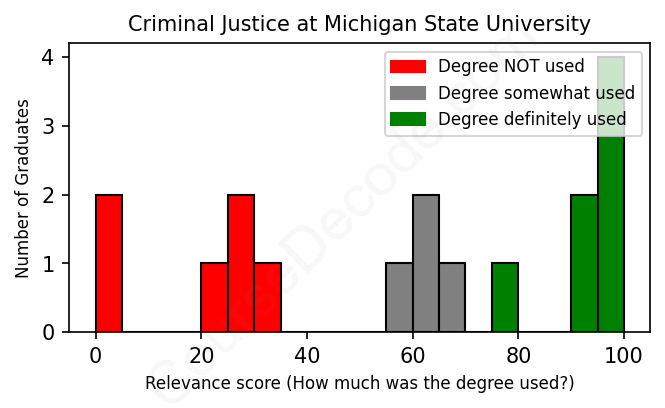
First, some facts. Of the Criminal Justice graduates from Michigan State University we've analyzed , here's how many have used (or NOT used) their degree in their career:

These are estimates based on AI analysis of 17 LinkedIn profiles (see below).
The verdict? Below average. Overall, with an average relevance score of 59%, Criminal Justice graduates from Michigan State University have a lower likelihood (-8%) of finding work in this field compared to the average graduate across all fields:
And for comparison, here's the chart for all profiles we've looked at across all degrees.
Also, after graduating, 47% of these graduates have pursued further education other than another Bachelor's degree (such as a Masters degree or other), compared to the average across all profiles of 35%. This suggests you may need more than just a Bachelors degree to be competitive as a Criminal Justice graduate.
See the details:
|
Relevance score: 0% We think this person has NOT gone into a career related to their degree. We think this person has NOT gone into a career related to their degree.
DEGREE INFOGraduated in 2017 from Michigan State University with a Bachelor's degree in Criminal Justice. No other secondary education since. JOB HISTORY SINCE GRADUATIONHostess Chili's Mar 2017 - Jun 2017 ABOUTNo information provided. |
The top 10 most common jobs done by the graduates we've analyzed (ranked most common to least) are:
When looking at the careers of people who graduated with a Criminal Justice degree from Michigan State University, it’s easy to see a mix of job types across the board. A lot of graduates are finding roles in law firms, such as becoming attorneys, paralegals, or clerks, which are directly tied to their studies and the legal system. Positions like police officers, asset protection roles, and various legal internships are also significant, showcasing a clear link to criminal justice principles. However, you’ll also find graduates working in fields that don’t really have much to do with criminal justice at all, like teaching, sales, or even working as wait staff. This makes it clear that while some graduates are landing jobs that directly use their degree, many are branching out into unrelated areas.
In general, it seems there are two paths for these graduates: one that stays closely aligned with their criminal justice training—think law enforcement and legal roles—and another that veers off into other sectors. For those graduates who went on to work in jobs like police officers, attorneys, or in legal support, their jobs are typically very relevant and require a solid application of what they learned in their degree. On the flip side, many have opted for careers that use different skills altogether, showing that a degree in Criminal Justice doesn’t always lead to a criminal justice-related job. So, even though there are plenty of relevant opportunities out there, the job market is diverse enough that not everyone ends up in a role directly tied back to their studies.
Here is a visual representation of the most common words in job titles for Criminal Justice graduates (this is across all Criminal Justice graduates we've analyzed, not just those who went to Michigan State University):

When looking at the career trajectories of graduates from Michigan State University with a degree in Criminal Justice, it seems like there’s a mix of paths that people take after school. Many of the early jobs for recent grads are in positions like police officers, security roles, or even legal internships, which makes sense given their background. For instance, some graduates began as police officers or legal interns right after finishing their degree, which indicates that they are heading into fields related to criminal justice. However, there’s also a significant number that drift into different areas like sales, teaching, or other unrelated jobs, which can be surprising considering their educational focus.
Fast forward five or even ten years later, and the picture gets a little more varied. While some people stick to roles in law enforcement or legal fields and climb up the ladder to become attorneys or even district attorneys, others have found themselves in roles that stray far from criminal justice, like retail management or education. There are even instances of people transitioning into security analysis or product protection roles, which might not directly align with what they studied. Overall, while a good number of graduates seem to find relevant careers in their field, many also pursue alternative paths that could be seen as unrelated to their degree. So, there is hope for a solid career in criminal justice, but it’s clear that not every grad ends up where they might have initially envisioned themselves.
Honestly, a Bachelor’s degree in Criminal Justice can be a mixed bag, and it really depends on your strengths and interests. At Michigan State University specifically, the program has a solid reputation and involves a good amount of reading, research, and writing. Some students find the coursework manageable, especially if they’re passionate about the subject and enjoy diving into topics like criminology, law enforcement, or forensic science. However, the complexity of the material can ramp up, and if you're not a fan of social sciences or like to avoid critical thinking, it might feel a bit tougher. Overall, I'd say it's about average in difficulty—challenging, but not impossible, especially if you stay organized and focused!
Most commonly, in the LinkedIn profiles we've looked at, it takes people 4 years to finish a Bachelor degree in Criminal Justice.
Looking at these MSU Criminal Justice grads, their financial outcomes seem pretty mixed. Some have landed solid positions, like attorneys or project managers, which typically bring in good salaries—especially as they gain experience over time. On the flip side, others have cycled through various roles, many in teaching or security, which usually pay on the lower side. For instance, teaching jobs can be rewarding but often don’t stack up financially compared to legal or managerial careers. Overall, it looks like while some are likely making decent money, others might not be hitting that level just yet. So, if you’re aiming for a high paycheck in this field, focusing on law or higher management roles seems to be the way to go!
Here is a visual representation of the most common words seen in the "about" section of LinkedIn profiles who have a Bachelor degree in Criminal Justice (this is across all Criminal Justice graduates we've analyzed, not just those who went to Michigan State University). This may or may not be useful:

Here are all colleges offering a Bachelor degree in Criminal Justice (ordered by the average relevance score of their Criminal Justice graduates, best to worst) where we have analyzed at least 10 of their graduates: